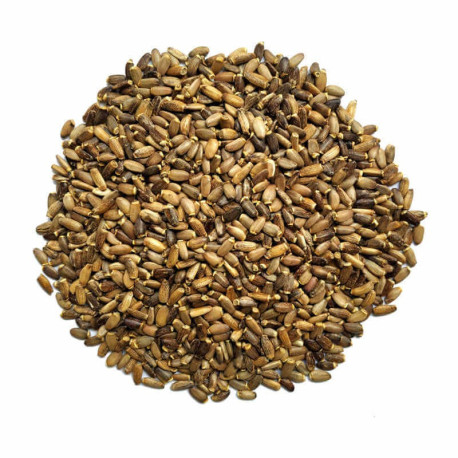





Reference: ChardonMarie-KG
The thistle-Marie seed has hepatoprotective properties. It is therefore excellent for our birds to avoid liver problems as a preventive measure.
The thistle-Marie seed has hepatoprotective properties. It is therefore excellent for our birds to avoid liver problems as a preventive measure.
The seeds of marie thistle consist mainly of:
- Flavolignanes: silymarines, protective agents of the liver,
- Flavonoids: quercetin, kaempferol, apigenin, etc.,
- Amines: tyramine, histamine, etc.,
- Fat: fixed oils (30% oleic acid, 6% palmitic acid), phytosterols,
- Carbohydrates (38%),
- Protein (23%).
Thanks to its small black or pretty electric blue seeds, the poppy is recognizable among thousands. A cousin of the poppy, the poppy is known for its content of good fats and micronutrients essential for the proper functioning of the body.
Clover stimulates the immune system and slows down cellular ageing through its excellent antioxidant properties. Rich in vitamins B, C, E and provitamin A.
Common names:
Wild teasel, Birds' cabaret, Venus' basin, Wolf's comb [Fr], Grote kaardebol [Nl], Wilde Karde [De], Cardo dei lanaioli, Scardaccione selvatico [Il], Cardencha, Cardo de cardador [Es].
Chicory seeds (cichorium intybus) are part of the health seeds that come from wild plants. These seeds are rich in fibres and minerals and promote intestinal balance.
They purify the body and are also effective in cases of indigestion.
Seeds for canaries and exotic and indigenous birds.
These seeds, rich in fats and proteins, are particularly appreciated by wild birds. They will attract redpolls, grosbeaks, goldfinches, black-capped chickadees, sparrows, mourning doves, and a host of other birds to your garden. They are often used as a substitute for rapeseed, which is more expensive.
The shuttle is almost similar to rapeseed, the difference lies in the bitter flavor of the latter. The shuttle seed is rich in protein and favorable to the improvement of song, so it is interesting during the breeding season in canaries. However, as this seed is quite fatty, we advise you not to exceed 10% of your shuttle mixture for colored canaries or posture canaries. For singing canaries, the shuttle softens the song and can therefore be used at 30% of the mixture: in the latter case, we advise you to accompany your bird's diet with liver support.
High-quality seeds with high fat content
- With a high content of vitamin E, B9, B5, B6, B1, B2, B3, and vitamin K.
- It has antioxidant properties.
- Excellent energy contribution.
- Rich in calcium, potassium, magnesium, phosphorus, proteins, zinc, thiamine, pectin (cleanses the body).
Dari, also known as sorghum or millet, is a variety of grain that is related to millet varieties. Dari is the size of a hemp seed. The grain originates from the warm regions of Australia, Asia, Africa, and South America. There are three varieties: white dari, yellow dari, and reddish-brown dari. It is noteworthy that more value is attributed to light dari than to reddish-brown dari. Regarding nutritional value, there is not the slightest difference. Furthermore, reddish-brown dari is well appreciated by lovebirds. Dari can be compared to wheat in terms of starch content. The seed has a favourable composition of amino acids. The protein present in dari has a particularly high leucine content.
Cardi seed is rich in protein and linoleic acid, which helps lower cholesterol levels and therefore reduce heart disease. It is found in budgie and parrot mixes but also for native birds such as bullfinches.
Cardi seeds are high in fat. The amino acid proportions of the seed are very favourable, the arginine content is very high. The seed is low in lysine and methionine + cystine, while tryptophan is completely lacking.
The flaxseed consists of 40 to 45% oil and 25% protein. Flaxseed preserves very well. It contains, in particular, two fatty acids with similar names (both derived from the word "lin"), linolenic acid (an omega-3) and linoleic acid.
The seed is used in animal feed, particularly for laying hens for which an increase in the omega-3 content of the eggs is desired.
Due to these properties, this seed aids digestion.
Improves liver and overall health of birds.
Suitable for a wide range of birds, including parrots, canaries, budgerigars, and other exotic birds.
Benefits for birds:
- Liver support.
- Detoxification: Helps eliminate toxins from the liver and improves digestion.
- Strengthening the immune system.
Instructions for use:
Dosage: Add a small amount (usually a teaspoon per day) to the birds' usual seeds. The amount may vary depending on the size and specific needs of the birds. Can be mixed with the birds' daily food.
Precautions:
Store in a cool, dry place, away from moisture and direct sunlight.
The canary seed is a grass, an annual plant up to 1m tall, the seeds being found in the inflorescences. These seeds represent a significant fraction of the majority of bird mixtures.
• Excellent for canaries, European and exotic birds, wavy parakeets and large parakeets.
• EXTRA canary seed has undergone extra cleaning and is of exceptional quality. Unique on the market!

The thistle-Marie seed has hepatoprotective properties. It is therefore excellent for our birds to avoid liver problems as a preventive measure.
